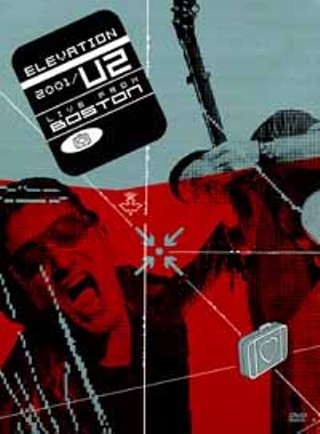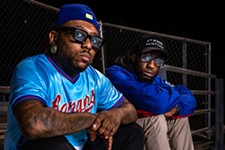Elevation
Taking Digital Music to the next plane
By Raoul Hernandez, Fri., Jan. 18, 2002

Now that all the Top 10 lists for 2001 have been turned in, overanalyzed, and forgotten, it's time the truth was revealed: Bob Dylan's Love and Theft notwithstanding, U2's All That You Can't Leave Behind, released fall of 2000, was actually the Album of the Year last year. It took home its Grammys in 2001 (though it may take home more in 2002), picked up its video awards in 2001, and continued infusing that one nationwide playlist with a string of singles, "Beautiful Day," "Elevation," "Walk On," and a song worthy of Song of the Year in a bad year, "Stuck in a Moment You Can't Get Out Of." With the band's upcoming halftime performance at Super Bowl XXXVI, the only TV show they haven't appeared on in the last year and a half is Everybody Loves Raymond.
Nielsen ratings aside, it was of course in the live arena that the Dublin four made an international impact in 2001, the third leg of its "Elevation" world tour going on sale here in the states weeks after the events of 9/11. Following stopovers in Houston and Dallas on the tour's first portion last spring, U2 even graced Austin's Frank Erwin Center with nearly two hours of roof-raising ecstasy on November 5. At that juncture, less than two months after thousands lost their lives in New York and Washington, D.C., there was hardly a hymn in the band's 19-song set list that didn't somehow speak to current events and their aftermath. "I can't tell you how proud, happy, and humbled we are to be in the U.S. at this time," said Bono from the stage, bowing.
Which made the appearance of a live document from the tour during the last week of November that much more timely, that much more of a salve for those who avow the power of music to soothe and heal. Close, but not a carbon copy of the Erwin Center set list, the two-disc, 19-song live recording slipped out into the holiday frenzy quietly, save for the folks at Waterloo Records, who boycotted the release thanks to chains like Best Buy getting product early. Nevertheless, Elevation 2001/U2 Live From Boston sought to capitalize on fans' re-ignited love affair with the 20-plus-year-old musical institution. It was one Friday evening, then, that the recording found itself on my front room stereo, blasting through the house at neighbor-rattling volume while holiday preparations were being made. Merry Christmas, baby.

As with the Austin date, Live From Boston launches with the CD version of the tour's namesake before the band steps into the big fuzz beat live midway through tune. Following it up with stained glass window shakers "Beautiful Day" and Achtung Baby's "Until the End of the World," Boston then segues into high-rotation highlight "Stuck in a Moment," ostensibly about INXS frontman Michael Hutchence's suicide, and "Kite," inspired by the death of Bono's father. It's about "letting go of someone you don't want to let go of," announces Bono soberly. "Could be a lover, could be a father. Could be a child -- could be a friend, I don't know." Together, these All That You Can't Leave Behind cornerstones are two of the strongest cuts on Boston, the new material ofttimes surpassing old favorites throughout the disc.
"Gone," from '97's terminally overlooked Pop, precedes another new song that took on eerie relevance after 9/11, "New York," and it was at this point, 20 minutes into Boston, that I passed the doorway to my living room and took note of the darkened TV screen. On a whim, I switched it on, only to be immediately and utterly entranced by the strobe lights pulsing to the song's loping beat. Needless to say, it was at that precise moment, with the music being cannoned through my speakers, that I truly understood the potential of my DVD player.
You did get a DVD player for Christmas, right?
Shoot to Thrill
That was, after all, what sold me on DVD players last winter, the fact they're compatible with CDs. Finally, one of those 5-disc carousel players would be mine. Digital quality movies were simply a bonus; as with the onset of compact discs in the early Eighties, the initial onslaught of DVDs has brought with it primarily new and mainstream titles. Naturally, Vulcan and I Luv Video still stock a universe of VHS tapes about as likely to see (timely) DVD conversion as all those old jazz LPs you're paying good money for at Antone's record store. DVD music titles, meanwhile, until recently, were on the order of the Rolling Stones' Bridges to Babylon Tour '97-'98, a VHS title that gains little in the crossover to digital video.
The beauty of Elevation 2001/U2 Live From Boston is not only that it was conceived solely for DVD -- the second disc has the extras, "Making of" doc, additional tracks, etc., all more or less superfluous -- but that it works simply as a live CD as well. In the wake of U2's gig here, their strong, compact catalog wasn't enough for me -- too finite. Suddenly, I was on the Internet buying bootlegs, which in turn meant getting shows of varying sound quality, crap packaging, and finally, ripped off. On Live From Boston, which eschews opening credits, on-screen menus, and FBI/Interpol warnings for a straight cueing up of the performance, you not only get two mediums in one, you now own a disc that doesn't exist as a commercially available CD.

Whereas Bridges to Babylon and its stronger live antecedent Voodoo Lounge exist in truncated form on CD, 1993's Rolling Stones Live at the Max doesn't. Unfortunately, the 85-minute concert film, commissioned specifically for Imax theatres, captures a lackluster gig from '89's Steel Wheels tour. The Who's titanic live set at the Isle of Wight Festival in 1970 exists in both DVD (dig John Entwhistle's full-body leather skeleton suit) and CD formats, but note that Bruce Springsteen's Live in New York City 2-CD set from 2001 is longer by some 45 minutes and packs a river's worth of extras. Roger Waters' In the Flesh also came out as both a DVD and 2-CD set, but only one allows you to see Doyle Bramhall II starring in the role of David Gilmour. And let's not forget box sets with DVDs such as SRV and the recent Dead Can Dance, 1981-1998.
Better yet, DVDs such as Joe Jackson Live in Tokyo from 1986, Neil Young's Silver & Gold, filmed at Austin's Bass Concert Hall May 1999, and AC/DC's Stiff Upper Lip Live have no CD tie-ins. Jackson's live set suffers from static angles and shots, but works as a straight audio experience, particularly at a running time of 112 minutes; it hooks you right away with skanking opener "One More Time," endears you with a blast of "On Your Radio," and caresses you with a lovely reworking of "Steppin' Out." Silver & Gold features seven of 10 tracks from Young's disappointing 2000 release, but again justifies itself better as a live CD despite its handsome, Austin City Limits-like choreography.
For its part, AC/DC's new Stiff Upper Lip Live typifies the best/worst of current DVD technology. On the one hand, it's the band's best live recording: a lean, mean, 22-song set list delivered before 80,000 in Munich last year. "Problem Child," "Hell Ain't a Bad Place to Be," "Shoot to Thrill," "Rock & Roll Ain't Noise Pollution," "Bad Boy Boogie," "Hells Bells," "Dirty Deeds Done Dirt Cheap," "T.N.T." "Shot Down in Flames," the Australian quintet comes off like a hard rock version of the Supremes: one three-minute gem after another. Holland/Dozier/ Holland got nothing on Young/Johnson/ Young, and Young/Scott/Young.
Problem is, the visuals suffer from MTV-itis: spastic cuts and enough zoom-ins to give the viewer motion sickness. That said, it's hard to turn away from the 140-minute performance, and oddly enough, as a live CD, it comes off somewhat poorly thanks to Brian Johnson having nicotined his already-thin voice away. Still, it's better than 1992's 2-CD Live album, which proved AC/DC hadn't made a good album since 1981's For Those About to Rock (We Salute You). As a live greatest-hits, this bad boy boogie is "Hard as a Rock." Angus!! ... Angus!! ... Angus!!
Once in a Lifetime
What makes the Talking Heads' unparalleled Stop Making Sense unique to concert films is that no two performances are shot the same. From the point that David Byrne executes opener "Psycho Killer" on an empty stage armed only with an acoustic guitar and a jambox, the dais steadily filling with equipment and musicians until "Burning Down the House," to a closing sequence sweating out "Girlfriend Is Better," "Take Me to the River," and "Cross-Eyed and Painless," Stop Making Sense plays as if it had a standard narrative structure. Sixteen relentlessly toe-tapping songs, 16 different setups to underscore each individual song. To the DVD add the infectious "Cities" and "Big Business/I Zimbra."

Inasmuch as the soundtrack has remained in print since Stop Making Sense debuted in 1984, it wasn't until 1999 that the album was remastered/ restored to match the theatrical release. That was, not coincidentally one assumes, also the year all four original band members made time to record (separately) a commentary track for the DVD. As did Jonathan Demme, who directed Stop Making Sense in conjunction with the band. Correction: Academy-Award winning director Jonathan Demme. In the illuminating commentary, Demme and Byrne both credit Blade Runner cameraman Jordan Cronenweth with all marvelous lighting and angle techniques employed through out Stop Making Sense. Thanks to the DVD, a priceless CD and movie just became one and the same.
Commentary tracks, in which any number of a film's makers -- usually the director -- talk over their creation, are one of the finer selling points of DVDs. If you've heard Francis Ford Coppola spewing anecdotal history about his Godfather trilogy, you know why. That two other drop-dead classic films about Rock & Roll Hall of Fame musical acts have made their way onto DVD with informative commentary tracks and other goodies is notable. Particularly when you're talking about D.A. Pennebaker's Don't Look Back, and David & Albert Maysles' Gimme Shelter. VH1 Behind the Music, eat your heart out.
Audiophiles will want to know that among Don't Look Back's "Special DVD Features" are five unedited songs from the film, whose singular flaw may be that it doesn't include whole live performances, and of the song fragments it does, not enough. Granted, "Love Minus Zero/No Limit" and "The Lonesome Death of Hattie Carroll" may lose some of their appeal without a visual counterpart, but until digital technology becomes truly compatible, playback options are limited. The media resolving copyright issues in court, Congress, and world market so we can all write code of we want where we want it may take more lifetimes than science currently allows. "Bonus Tracks" suits these five songs for now, Ramona.
The alternate take of Pennebaker's iconic opening scene, Dylan trying to keep pace with his own "Subterranean Homesick Blues" via cue cards, is noteworthy, while the director's commentary is entertaining and not unuseful. (Perhaps not explaining the whole Donovan motif is best in the final analysis.) It doubtless goes without saying that the only thing that really matters about this B&W tour document from 1965 is Dylan himself, all of 24 at the time of this English tour, and already so fully formed as a artist. More than three decades later, Don't Look Back may just be as crucial a music library item as Bringing It All Back Home.

In terms of young, beautiful, and defining of rock & roll, the Rolling Stones circa 1969 couldn't be more so. That the band helped bankroll the Maysles North American Tour tagalong didn't exactly hinder the established documentarians from literally falling into one of the most symbolic events of the Sixties: Altamont, the last date on the tour. In that sense, Gimme Shelter is basically two distinct films, the Madison Square Garden live shows at the outset, blood-roiling run-throughs of "Jumping Jack Flash," "Satisfaction," "Honky Tonk Women," and "Street Fighting Man," and the second half of the movie -- Hell's Angels running roughshod over hippies on a cold night in a dark field up in Northern California. The brown acid couldn't have been a worse trip.
Criterion's top-line DVD is crammed with extras, from its fat booklet with essays by Stanley Booth and head Angel Sonny Barger, to the entire four-hour post-concert radio call-in show put on by KSAN. Albert Maysles commentary (David died in '87), along with co-director Charlotte Zwerin and soundman/musical supervisor Stanley Goldstein, is quite insightful about Altamont, and in addition to new sound and color mixes done for the film's re-release and DVD debut in 2000, the live footage outtakes are exactly what Stones fans want.
The best is "Prodigal Son," a Beggars Banquet delicacy that gets acoustic/on-stools-at-the-foot of the stage treatment from Mick 'n' Keith. When ol' riffhard pulls up short on his National Steel guitar, rubber lips' look of surprise is worth the premium you'll pay for Gimme Shelter.
I Will Follow
Truth be told, it wasn't "New York" that made me turn out the lights and watch the rest of Elevation 2001/U2 Live From Boston in the dark like glassy-eyed Gollum repeating "my precious" in his cave. It was the next song, "I Will Follow." When Edge lights into the song's firehouse clang and the visuals start cutting to the beat of Larry Mullen Jr.'s toms, two hearts beat as one -- in your throat. "Sunday Bloody Sunday" stokes the flames higher, and by the time the show hits its orgiastic end-run, "Bad," "Where the Streets Have No Name," and "Bullet the Blue Sky," the encores almost don't matter.
It was so galvanizing, I ran right out and bought the Rattle and Hum DVD, Paramount Pictures' account of U2's previous musical bull's-eye on America, 1987's The Joshua Tree. The band's struggling to explain itself is still painful to watch all these years later, but the live segments, Bono as Jesse James fronting the Clash, have meat on their bones. "Exit" might as well be Strummer & Co. live at the Palladium.
Like tracks between the two DVDs are comparatively interesting, but only "I Will Follow" from Elevation 2001/U2 Live From Boston lives in my mind's eye as it rings in my ears. Who needs a morning cup of java when, like a CD player, you can repeat a track as many times as your psyche needs? DVD is the future all right.
Now how do you wire all this Surround Sound stuff? ![]()








